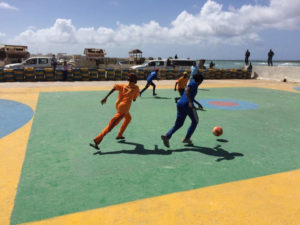
Presentation at the World Urban Forum Children and Youth Roundtable Generation 2030: Youth Leadership for a Better World – Innovative Youth Leadership Strategies in the face of Social and Climate Crises
I am here to speak on the role of the global sports movement and the potential of its billions of young people all over the world – organized or unorganized – to make sports carbon neutral.
The almost endless series of interstate UN climate meetings leading to nothing – the so called COPs – Convention of parties – makes it evident that there is a need for strong, dynamic initiatives from the bottom and up with civil society, local government, academia and media in the lead. We are close to a climate apocalypse. Young people need to take the initiative. We need more Gretas and Leila- sporting Gretas and Leias.
Global sports – organized and unorganized – including their transnational business subsidiaries and partners – is the world’s biggest socio economic movement with billions of members. Collectively it has enormous potential for climate adaptation and mitigation. With unique possibil-ities for change in climate positive behaviour. A starting point would be that each and everyone produce individual climate budgets as a starting point for reducing their own footprint. We are individually responsible. Pressure from below is now a prerequisite to mobilize the Federation of Football Associations and the International Olympic Committee to take consistent, well coordinated action to conscientize its national members and partners on climate challenges. The campaign against racism in sports is an example to pursue. Youth has been the driving force behind such campaigns.
Thus, measures to remedy the situation lie to a large extent in local action – be it advocacy or operational. I would like to mention one specific example of a sports club that has acted in practice. It is the Forest Green Rovers” (FGR) from Gloucestershire on English football’s third level. FGR is the world’s first UN certified, carbon neutral football club having joined the UN initiative “Climate neutral now”. It is also globally recognized as the first vegan club by the British “Vegan society”. The Club’s management recognized that the industrialized livestock industry was damaging the welfare of animals. At the same time aiming at improving both the players’ and their own performance and health. Wanted to provide their spectators with more tasty and healthier food than hot dogs, burgers and fish and chips. The result came immediately. Last season FGR almost made it to level 2: Championship. Because of healthier food?
The company ECOTRICITY now supplies non-fossil energy to FGR’s sports centre. It is in its entirety run by clean energy. Part of it is being produced by solar panels in the arena. All home matches are played on natural lawns and the grass is mowed by solar energy driven cutters. The parking lot is built with charging facilities for electric cars. All cars used in connection with transport to and from matches are electric. Each player has an electric car at his disposal. Precipitation is collected and distributed to reduce consumption and expenses. It is used to irrigate the pitches that are treated without pesticides and fertil-izer. The football uniforms – green with sebra stripes – are made with bamboo as basic material. The plastic in the fabric is thus reduced with 50%. FRG try avoiding travel by air. Sports men and women belong to the group of most frequent flyers in the world. The globally top 20 football players annually cause 505 tonnes of CO2 emissions – the equivalent of burning 250 tonnes of coal.
What if all sports clubs in the world would do the same as FRG?
FRG is now setting up a factory to produce vegan fastfood – branded” Small green devils”- for schools, universities and business enterprises in their neighbourhood. It implies an additional income for the club, important also for people’s health. FRG’s most famous plan is to construct a new stadium entirely in wood within the borders of an eco-park of 500 trees. Compared to concrete this implies reduced CO2 emissions. It is FGR’s intent to construct the world’s greenest football-arena.
So, to conclude Mr. Chair, we all need to become small, green climate devils. Sports devils.

Erik Berg, Habitat Norway



